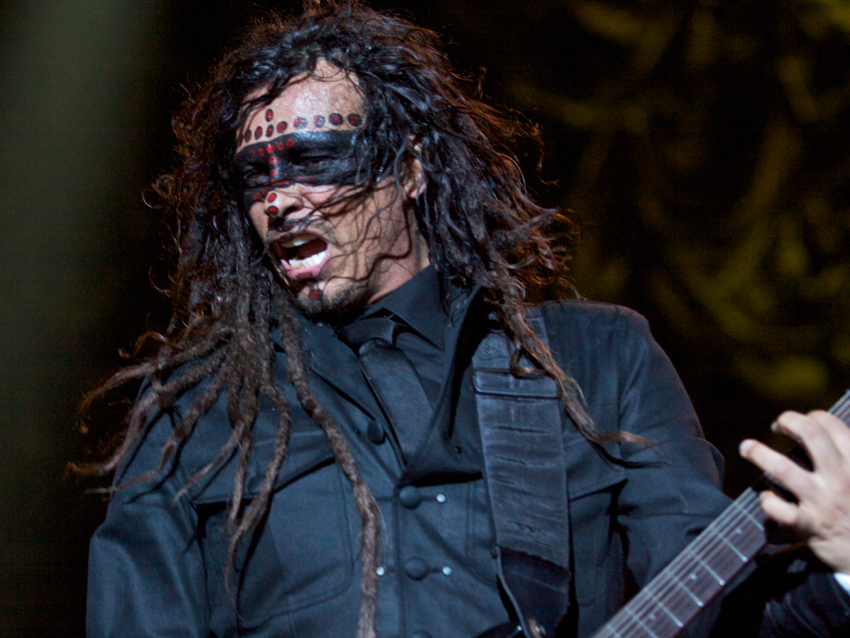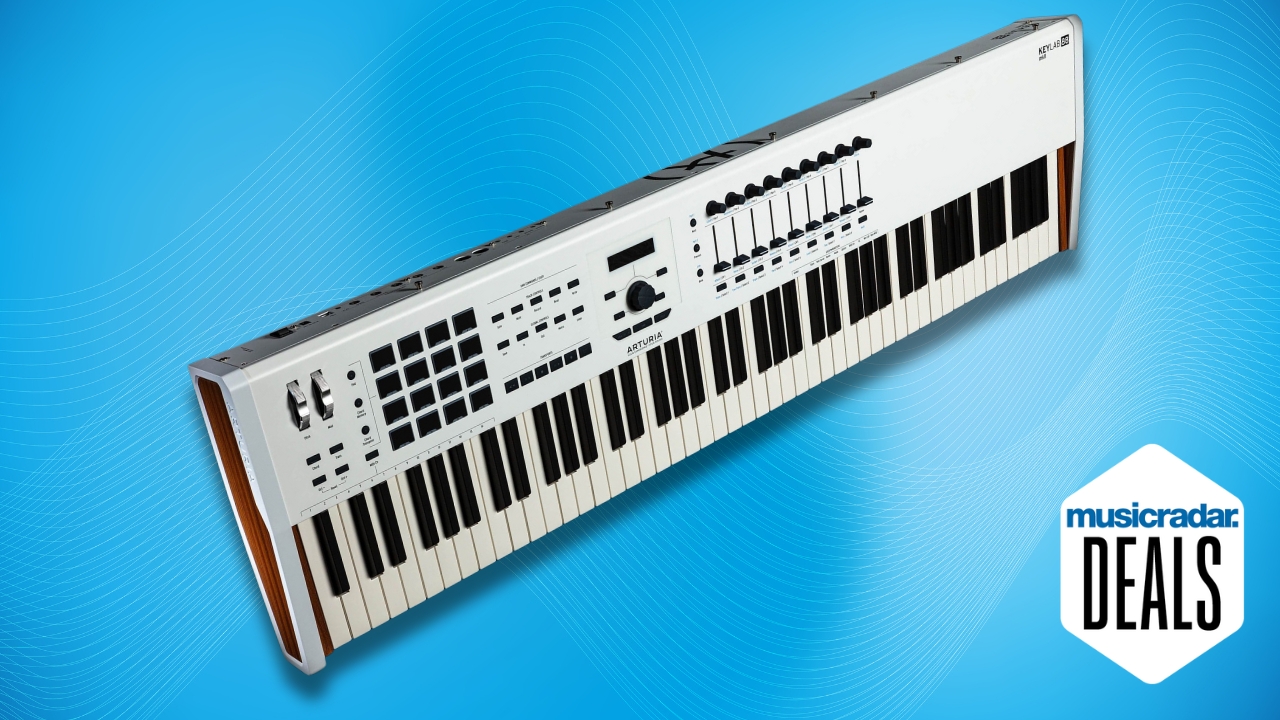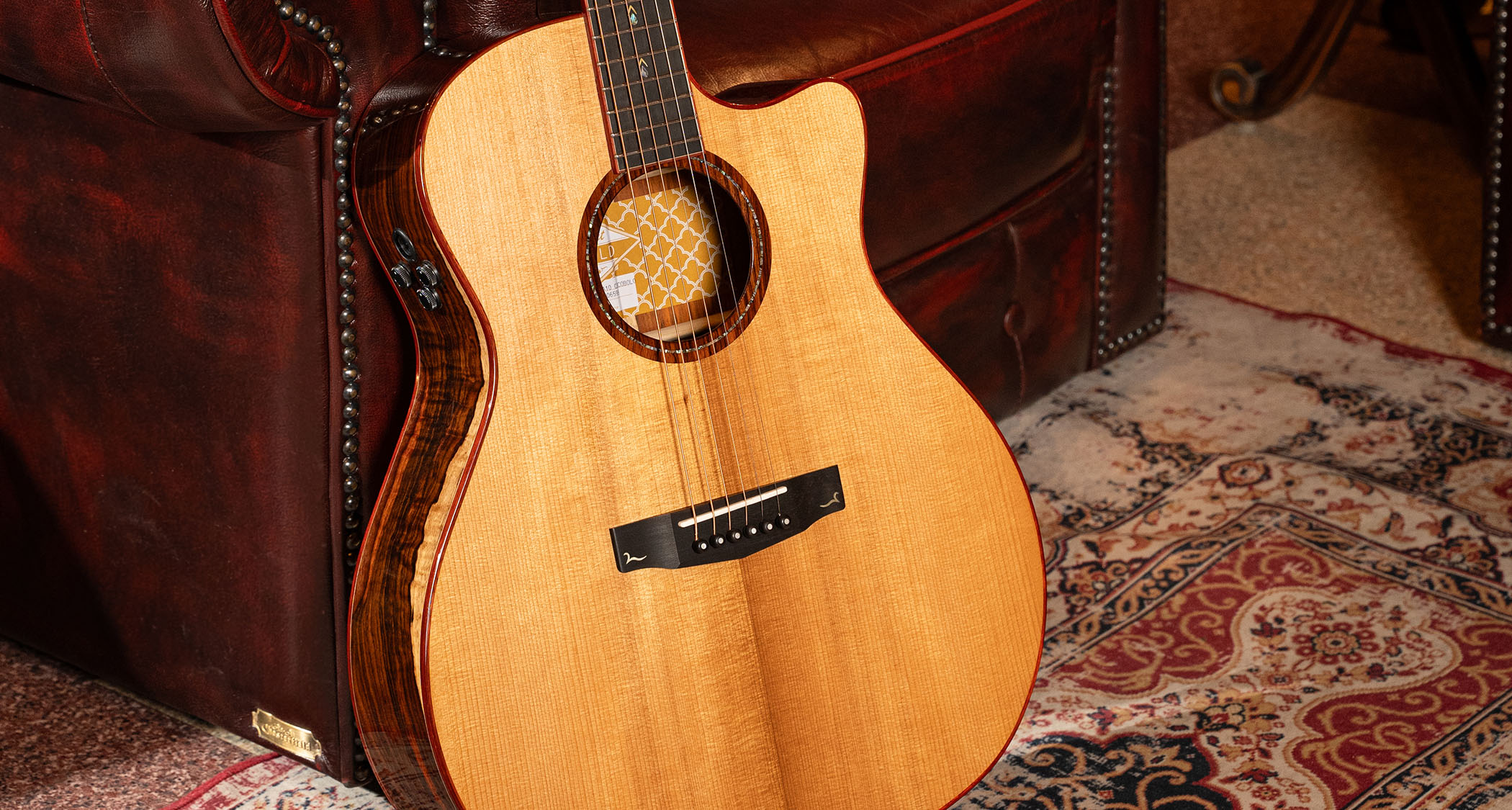
James "Munky" Shaffer on stage with Korn in Toronto, 2011. © Brian Patterson/Corbis
"This is a huge accomplishment for Korn," says guitarist James "Munky" Shaffer about The Path Of Totality, the upcoming album on which the Bakersfield-based nu metal stars embrace pounding dupstep production. "I think we're really on the verge of breaking to a bigger audience, which is pretty cool since we've been around for almost 20 years."
Hard to believe, but it has been almost two decades since Munky and his Korn-mates (the band still includes original members Jonathan Davis, vocals, Reginald "Fieldy" Arvizu, bass) put a darker-than-dark and decidedly downtuned spin on heavy metal.
The group's relentlessly sinister sound is very much intact on The Path Of Totality, but it's stretched and mutated in a myriad of fascinating ways thanks to a series of collaborations with electronic producers like Skrillex, Noisia, Datsik, Feed Me, Downlink and Kill The Noise, among others.
Munky sat down with MusicRadar the other day to discuss Korn's somewhat surprising change in direction and what it might mean for the group in the future.
The move into the land of dubstep - who initiated it?
"Jonathan wanted to include some of elements of dubstep on the new album. I remember he played me some tracks from Skrillex's Scary Monsters And Nice Sprites record. He was super into it, telling me that this is what was happening, this was the new sound. He was very pumped about us trying to incorporate characteristics of the genre into Korn.
Get the MusicRadar Newsletter
Want all the hottest music and gear news, reviews, deals, features and more, direct to your inbox? Sign up here.
"To me, the willingness of the dupstep producers to collaborate with us, that was key. If they were just going to mess with our sound and remix us, I wouldn't have been so into it. But they turned out to be very open-minded. It was a little scary, though. The whole thing could've been one big disaster."
Sure, but sometimes bands have to take a leap and reinvent themselves.
"Yeah, I get that. You want to push yourself and challenge what you're doing, even if it means going somewhere totally new and throwing your fans a left curve. But dubstep or not, we're still Korn. We're still Jonathan, Fieldy, Ray and me."
Even though reinvention can be crucial, does it concern you at all that Korn aren't pioneers in dubstep - as you were with nu metal?
"Not really. You can only be at the forefront of so much. This is our 10th album, and we needed to shake things up - for ourselves. Sometimes that takes doing something new. What we're doing with dubstep reminds me of what we did years ago when we mashed up metal and hip-hop. We weren't the first ones to do it - Anthrax were there with I'm The Man, and Aerosmith did the collaboration with Run-DMC - but we offered our own perspective on what was going on.
"Bands can get locked into formulas and habits. You don't want to, but it happens. So if we can get excited about doing something that we haven't beaten into the ground, then we'll probably get a lot of our fans into it, too. Not everybody, but a lot of them - and we might attract new fans."
What was it like to work with Skrillex? Did you present riffs to him?
"He came to our studio with his laptop and played Jonathan and me some ideas. We chose three or four tracks, imported the files into Pro Tools and started working on them. I started riffing over the bass drops and the electronic stuff that he had written. Then he'd take what I did, chop the parts up, and I'd relearn them. We send files back and forth - it was cool."
So Skrillex pretty much worked with your ideas. He didn't "produce" you per se.
"That's right. It was very collaborative. He didn't produce in the way that most people do, but he did make suggestions. The skeleton of the songs were his, and we would put our skin around it.
"We got a real chemistry happening with him. He knows Korn inside and out. In fact, he's been a fan of ours since he was 14 years old. When he came to the studio, he was like a little kid: 'I can't believe I'm in Korn's studio! Oh my God, there's Munky's guitar - can I play it?' [laughs] It was great to see that kind of sincerity. When somebody really wants to work with you and has passion, it's infectious."
What about Noisia? Did you have a good time with them?
"We had a good working relationship, but we didn't hang with them. They sent us files and we stacked on tracks, layering things. A lot of the time it was me and our engineer, Jim Monti, fleshing things out. Later on, Jonathan and the other guys would come in and move things around."

The "devil's horn" sign and eight strings - now, that's metal! © Paul A. Hebert ./Retna Ltd./Corbis
As a guitarist, was this process satisfying for you?
"No, it's quite different, that's true. I look at every situation as an opportunity to learn. Actually, I enjoyed this experience because it offered me a chance to really do my own thing - I wasn't working with a totally blank canvas, but I did have a lot of space to myself. I did a lot of coloring and decorating."
Jonathan stated recently that he thought dubstep was the new metal. Not "nu metal," you understand…
[laughs] "Yeah, 'new' metal! Hmmm, I don't know if I understand the genre of dubstep enough to comment fully. Other than what we've done and what I've heard from the producers we've worked with, I'm not totally up on it. But I can agree with him that it's super-aggressive - very metal, in many ways. The notes are dark and minor-key, spooky, full of eerie sounds. Strip away the keyboards and you have a lot of banging tracks."
Did you play your Ibanez Apex signature 7-string guitars on the new record?
"Definitely. I used the 7-string models, and I played an 8-string on a couple of tracks to get that really low growl. Those are my main guitars. I did play a couple of vintage Les Pauls and Telecasters - there's an old Silvertone, too - to polish up the sound a bit."
Chording on an 8-string guitar - what goes into it?
"It's not that complicated or weird. It's really to give you that extra low note, that cool baritone sound. It's really great for what we do. You can't tell if it's a bass or a guitar or a keyboard - it fools the ear."
What are your thoughts on some of the other "nu metal" bands that came up at the same time as Korn?
"You know…I see some are still touring, and a few are evolving. Initially, we got kind of upset by the other bands. We were like, 'Who the hell do they think they are? This is our sound. We created this!' The followers agitated us. Now we're flattered that they put their own stamp on what we did. Artists inspire artists - that's the way it goes."
Joe is a freelance journalist who has, over the past few decades, interviewed hundreds of guitarists for Guitar World, Guitar Player, MusicRadar and Classic Rock. He is also a former editor of Guitar World, contributing writer for Guitar Aficionado and VP of A&R for Island Records. He’s an enthusiastic guitarist, but he’s nowhere near the likes of the people he interviews. Surprisingly, his skills are more suited to the drums. If you need a drummer for your Beatles tribute band, look him up.
“I can write anything... Just tell me what you want. You want death metal in C? Okay, here it is. A little country and western? Reggae, blues, whatever”: Yngwie Malmsteen on classical epiphanies, modern art and why he embraces the cliff edge
“You're by far the best guy that we've tried. I would love to have you in the band”: So why did Trent Reznor turn down Richie Kotzen for Nine Inch Nails?










